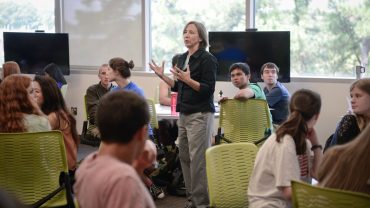College Counseling and Student Development
The Master of Education (M.Ed.) in College Counseling and Student Development is a distance education master’s degree for the counseling professional working in higher education. Program graduates are equipped for counseling and advising positions in student service agencies at colleges and universities such as counseling centers, advising offices and career services.
Program faculty and students enjoy an excellent relationship with professionals in the University Counseling Center and the Division of Academic and Student Affairs at NC State University, and many opportunities for relevant experience are provided through internships in the various agencies. Competence in theory and practice is emphasized. Students participate in individualized field experiences appropriate to their area of study.
In light of our commitment to multiculturalism, we are particularly interested in attracting students from varied cultural backgrounds. In recent years, we have increased the proportion of culturally different students from less than 5% to almost 20% of our degree candidates. Our curriculum content acknowledges the significance of cross-cultural perspectives in counseling theory, research and practice.
Visit the College of Education program website for more information.
This program may lead to Professional Licensure.
Eligibility
Applicants must submit:
- Completed online application, the departmental application form, your resume and non-refundable application fee
- 3 recommendations from people who know your academic record and potential for graduate study (letters should be uploaded online)
- Official transcripts of all post-secondary education
- **Official statement of English Proficiency (TOEFL) for international students
- All students must be able to complete their field experiences (Practicum and Internship) in the state of North Carolina
Selection for admission is based on a number of considerations:
- Academic achievement, especially in the junior and senior undergraduate years, as well as performance in any graduate courses, is carefully evaluated for evidence of competence in intellectual inquiry.
- Performance ratings and recommendations from professions and supervisory personnel are also carefully examined for evidence of personal qualities requisite for professional competence.
- Demonstrated leadership activity and/or significant work experience represent additional important factors.
- Interview process –candidates are selected to be interviewed, barring significant geographical distances.
- Other additional materials are also welcome to supplement the application –such as a research paper, a video of some "helping" activity by the candidate, etc.
Applications and all supporting documents must be received on or before the Graduate School Priority Deadlines or the Program Deadlines. International students should also consider their specific deadline, which is earlier.
**Request the test center to send your scores directly to NC State when taking the exam: TOEFL Institution code 5496. Upload unofficial copy when submitting application.
Plan of Study
The online option is a three-year, part-time cohort program that requires students to take courses year-round including summer. Students begin in Summer II (June), and typically take two online classes in fall and in spring. During the final year, some on-campus (weekend) classes are required.
Career Prospects
Completion of a master's degree in counselor education is the first step to becoming licensed to practice in the state of North Carolina. Students are eligible to take licensing exams in their field during the final semester of the program.
College counseling and student development professionals provide valuable input and support to students in need of career counseling or assistance navigating academic, social, emotional or resource challenges. Typical employers include high schools, community colleges, career counseling centers and both private and public two- and four-year higher education institutions. As a college or student development counselor, graduates of the M.Ed. in College Counseling and Student Development work with students, parents, guardians and social service providers to ensure students have the support they need to succeed.

